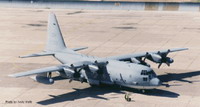Mali rebels fire on US military plane
Suspected rebels in Mali opened fire on a U.S. military plane. No one was wounded and the aircraft landed safely despite suffering minor damage.

The attack on the U.S. Air Force C-130 occurred between Tuesday night and Wednesday morning over Tin-Zawatine in the far north of Mali, said U.S. Maj. Pam Cook, a spokeswoman for the U.S. military command in Stuttgart, Germany, which covers Africa.
American forces have conducted counterterrorism training with Mali and other nations in the region for years, and had just finished conducting military exercises with Mali's army.
Another U.S. official in Stuttgart, Air Force Maj. John Dorrian, said the plane was the only U.S. aircraft in the country and had been there for the training exercise. He said the aircraft had responded to a rare, one-time request for help from the government.
The plane was carrying about 14,000 pounds (about 6,000 kilograms) of food provided by the Malian government and the airdrop was completed successfully before the attack, Cook said.
"This mission was conducted at the request of the Malian government," Cook said by telephone from Stuttgart. "We would do this for any partner nation that we're working with when their troops are pinned down."
It was unclear if the Malian troops' movements were restricted by rebel fire or because the area was heavily mined.
Mali's military says delivering food by land to the region is no longer safe because rebels have mined much of the area.
Cook said the aircraft suffered "minor damage," but landed safely and did not return fire.
Malian officials gave similar accounts and called the gunmen "armed bandits," a phrase the government uses for Tuareg rebels active in the far north. Cook also cited U.S. officials in Mali as saying that the attack was perpetrated by "armed bandits."
Mali army spokesman Col. Abdoulaye Coulibaly confirmed a military plane flying a mission to Tin-Zawatine was shot at, though he said he could not confirm whether it was American. He also said no one was injured.
Another senior Malian military official, who spoke on condition of anonymity because he is unauthorized to speak to the press, said the plane landed safely in the capital, Bamako. He said gunmen used automatic rifles in the attack and said the incident occurred early Wednesday.
Though Mali is often called one of the most stable countries in West Africa, it has suffered a rebellions several times since the 1990s. The Tuaregs are a semi-nomadic people, part of the Berber ethnic group, and many say they suffer discrimination at the hands of Mali's Bambara-speaking majority.
Last year, Tuareg rebels rose up again, but signed a peace deal with the government in July 2006. A Tuareg faction led by Ibrahim Bahanga rejected the deal, however, saying it did not do enough to help the ethnic Tuareg minority he claims authorities discriminate against.
The government blames Bahanga for a new spate of attacks and kidnappings targeting the army in recent weeks. This month, rebels released 10 of about 30 soldiers they had held for more than week.
Neighboring uranium-rich Niger is facing a similar Tuareg rebellion. Over the weekend in neighboring Algeria, a suicide bomber rammed a delivery truck packed with explosives into a coast guard barracks in northern Algeria, killing 30 officers.
The U.S. military's interest in the region revolves around concerns far removed from the Tuareg uprising. The U.S. fears al-Qaida-linked terror groups could theoretically use northwest Africa's lawless, unpoliced deserts - long used by smugglers - to train, set up bases, or plan attacks. U.S. official say the goal is to prevent the region from becoming a copy of Afghanistan prior to the Sept. 11 terror attacks, when it sheltered al-Qaida training camps.
American commanders say the No. 1 terror threat in Africa outside its northeastern Horn is Algeria's Salafist Group for Call and Combat, an al-Qaida affiliated movement that is mostly active in Algeria that has been blamed for attacks in neighboring nations including Mauritania.
Dorrian said the U.S. military has conducted training exercises with African countries for 22 years, and American forces deployed to Mali recently were there for temporarily on training missions. Most missions typically involve dozens of U.S. soldiers at a time.
Dorrian said the U.S. military has no permanent presence in Mali and does not supply arms or ammunition to the government.
Africa's growing prominence in U.S. security thinking has been underlined by plans for a U.S. military command for Africa.
Under the U.S. military's system of regional headquarters, responsibility for Africa has been split between the Pacific Command, Central Command, and European Command. AFRICOM, expected to start work in November and initially operate from Germany, will coordinate U.S. peacekeeping and humanitarian missions and efforts to work with the military in Africa to develop their capacity to run peacekeeping operations and tackle security threats such as terrorism.
Subscribe to Pravda.Ru Telegram channel, Facebook, RSS!





